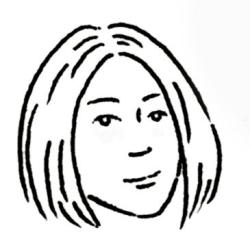Your Interview Chizu Nara

Chizu Nara
Designer
Japan
Introduce yourself (name, company, position, country) and tell us how you got into lighting design (including education/qualifications).
My name is Chizu Nara. I'm a lighting designer and the co-founder of New Light Pottery, which I started with my husband.
My major was economics at university, although I was interested in architecture in high school. I didn't have enough background to apply for the architecture faculty, so I couldn't choose what I wanted at that time.
However, after entering university, I was painfully aware that economics was not what I really wanted to do, so I decided to go to a vocational school of interior design at the same time. I wanted to take the furniture design course there, but the school didn't open it because I was the only applicant. Instead, I chose a spatial design course. It was not my first choice, but I enjoyed designing space once I started.
After graduating from both, I joined an interior design company as a designer. However, a few years later, I had to leave the company because I got laid off.
Then, one day, an acquaintance at Maxray, a lighting manufacturer, in sales asked me, "will you help us draw lighting plans? I will teach you about lighting design." After that, I enter the company, and that was how I got into this field. I was not interested in lighting initially, but the more I worked, the more interesting the job became.
The projects I got ranged from mass merchandise retailers to famous designers' propositions. It was challenging, and I liked my job. However, I gradually started to question that the cycle of building commercial facilities was too fast. Also, at the time, I needed to take my maternity leave. I slowed down my work and came to think about starting a business with my husband, who worked at the same company.
We finally started our own business for our future and child-raising when we had our new house built.
Tell us about your work – is there a specific type of project you like to work on or an area you specialise in and why?
We are in the business of planning/designing lighting and manufacturing/selling lighting fixtures.
Eighty to ninety percent of our planning/designing projects are commercial facilities, mostly restaurants and hotels, and occasionally housing projects.
When we started our business, we only designed lighting. However, our projects were getting more in need of custom-made fixtures to match our design, so we started to design the lighting fixtures ourselves. We actually wanted to manufacture something from the start. We commercialized original fixtures from the bespoke designs and began selling them.
Major lighting manufacturers usually mass-produce their products. It was difficult to do the same for the "material-feeling fixtures" we were trying to make, but we thought we could make them on a small scale.
We have several partner factories to have the parts of the fixtures made. It's more costly and time-consuming than making typical fixtures because only skilled craftspersons can make the parts. But we want to keep the quality so that we can sell our products with confidence.
I like to work on a scale that allows me to focus on details and convey them to the clients and users, rather than on large scale projects. It's essential for me that I can control the quality of design myself.
What project are you most proud of and why?
Most recently, the Good Nature Hotel in Kyoto left an impression on me. The hotel had about 140 guest rooms. I was in charge of the lighting design for the entire facility and also supplied the custom-made fixtures to every guest room. Our factories became hectic because we had never experienced such a large order. I have worked in the lighting design business for a long time, but there were many things in the project I'd never experienced before.
I haven't been satisfied with my projects so far, even after the completion. Of course, in relative terms, they were not bad, but there were things that I had no choice but to give up what I want to do or hadn't been thorough enough. I haven't felt confident that I fully achieved my goal of the projects. I think I tend to see my lighting works objectively.
For me, first and foremost, an architect or designer decides what they want to create, and then a lighting designer does her/his job to make it happen under their direction. Even if I do a great job as a lighting designer, that doesn't necessarily mean the project is successful. I've never thought of the projects as my own artworks. They treat me fairly, and we should respect each other as equals, but I think of myself as one of the project's brains.
What is the biggest challenge that you have overcome in your career?
I struggled with a university relocation project. I had never done such a huge scale project or a public facility one like this before. It was also quite challenging for me to communicate with the architect and people I hadn't worked with. There were a lot of pressures, and I was stressed out.
Lighting represents design and building facilities. It is tough to take the balances between the two, and that always concerns me. The design is essential, but the appropriate lights of the facility are necessary. In this project, it wasn't easy to get a consensus on it from the team.
I think it's important to find out how to balance them. We can display the light sources as a series of design, not just "equipment," or make them seem less noticeable.
How does light inspire you?
It may sound too realistic, but I just happened to encounter the lighting design. I love architecture, interior and other spatial design, and lighting design belongs to these categories. It's one of my "favorite jobs" but not my best.
For me, lighting design is one of the jobs that allow me to cover the whole process myself.
It is challenging because it has many aspects; it can be a product, a facility, and more.
What is your message for other Women In Lighting?
I always ask myself if I'm acting as a professional.
I couldn't work as much as I wanted at the previous company when my children were little.
When my child got a sudden fever, I sometimes tell a lie to my boss to leave work early. I didn't mention the fever and just made up reasons not related to children. Of course, my boss and colleagues would say OK to leave even if I told them what happened honestly, but I did not want them to think I couldn't work enough or was difficult to work with because I have children.
My husband worked in the same section of the company, but everyone, including myself, thought I deserved to leave early and take care of my children because I am a woman. I occasionally asked for a sitter, but some people were surprised when I said that. I myself felt guilty about asking for help.
I think we still have such an old-fashioned gender role. I hope the value and situations will have changed when my children become adults, but we need more time anyway.
Some think we women have a way out because we have many life choices, which is not true. Some think women are just naive if we don't show professionalism. On the other hand, I'm aware that I've got a lot of help from people around me because I'm a working woman. I think we have to commit to our works as professionals and get recognized for our abilities, after all.
––
Interviewed by Lyshus; Translated by Akane H
“It’s essential for me that I can control the quality of design myself.”




